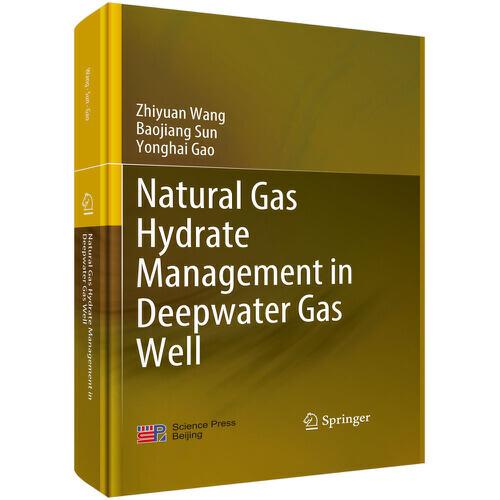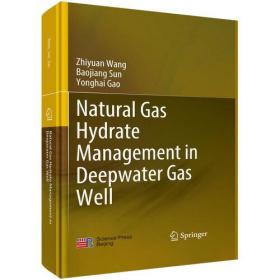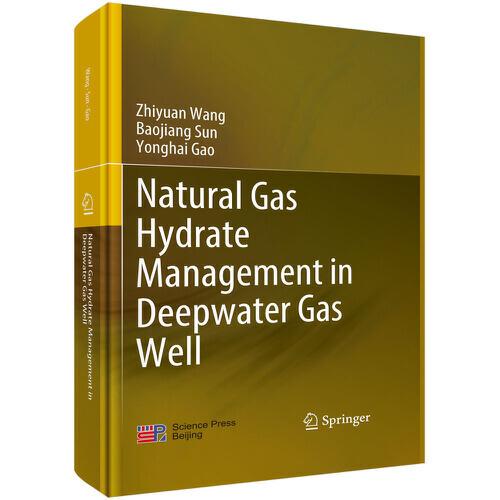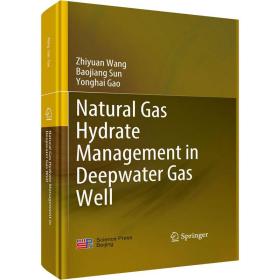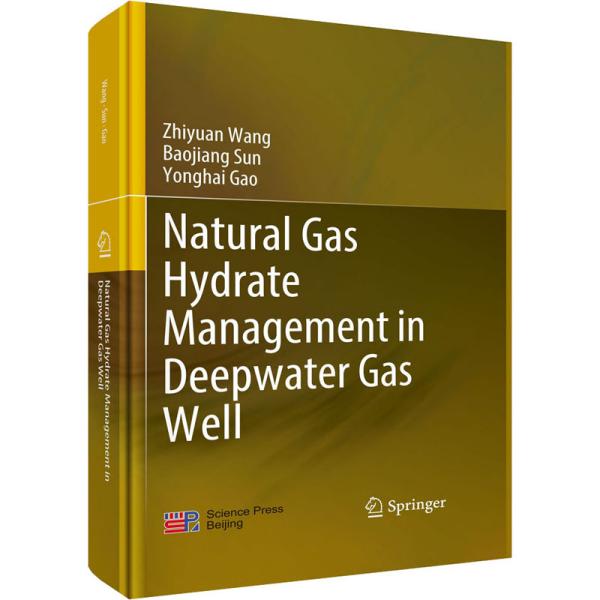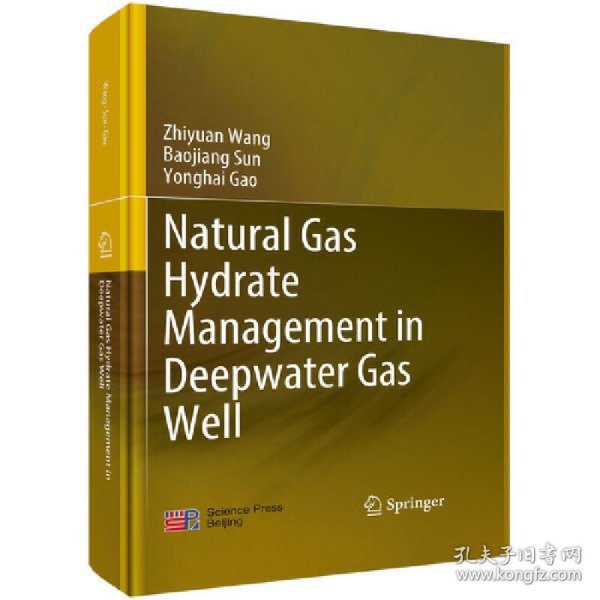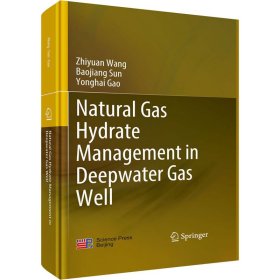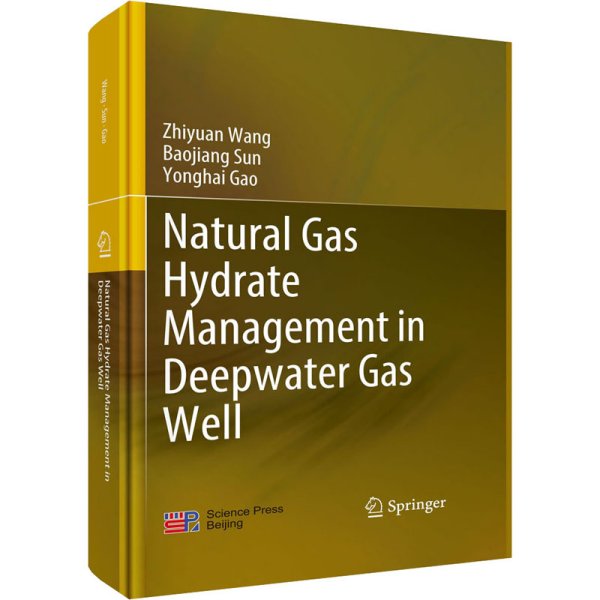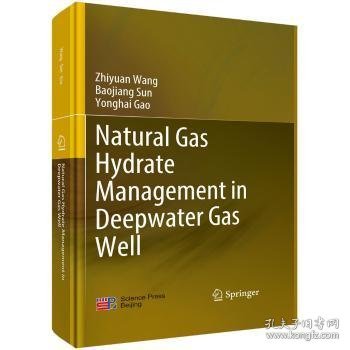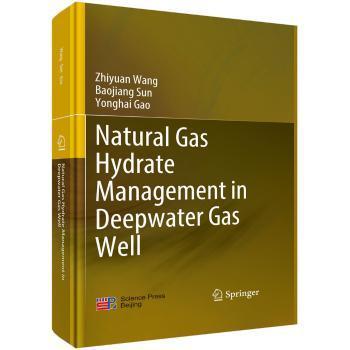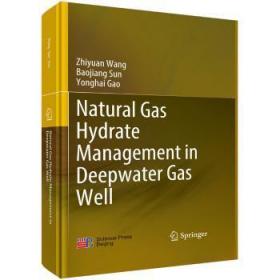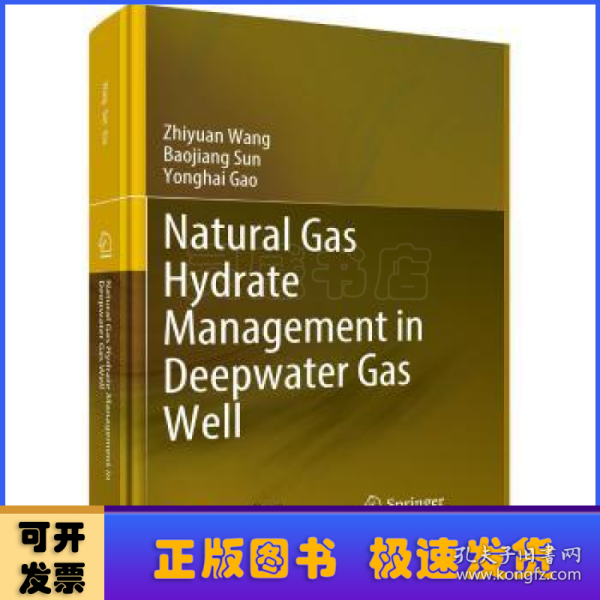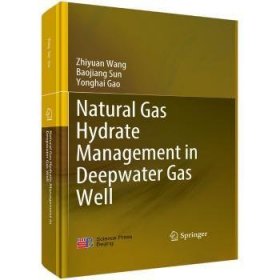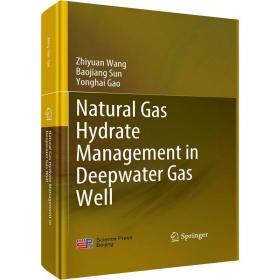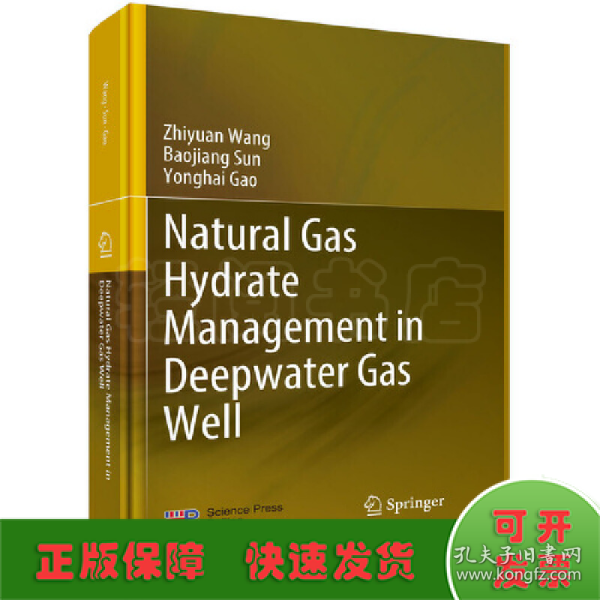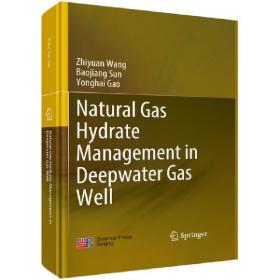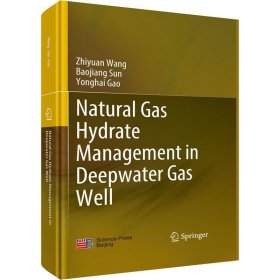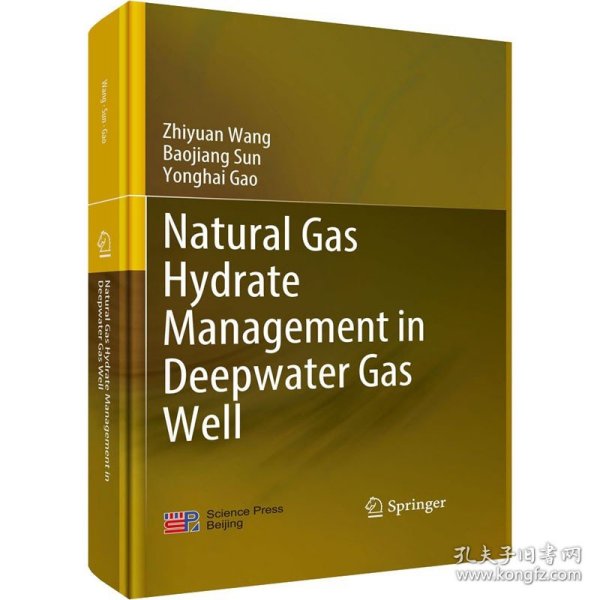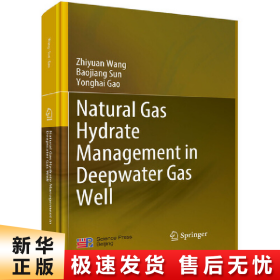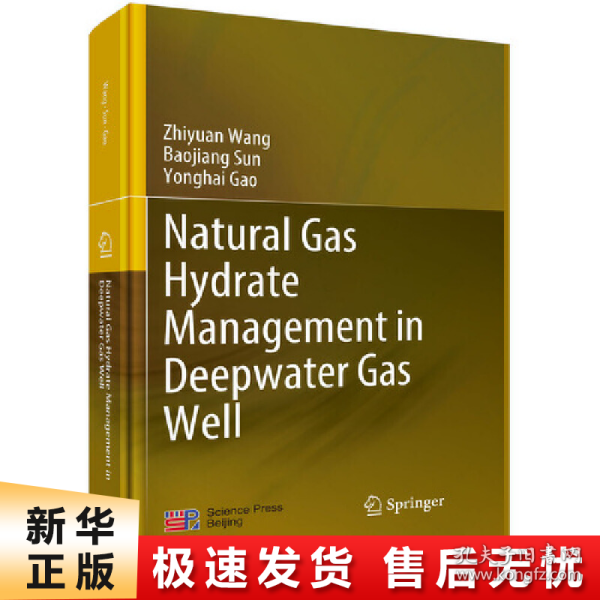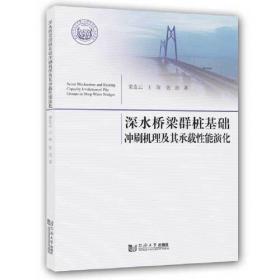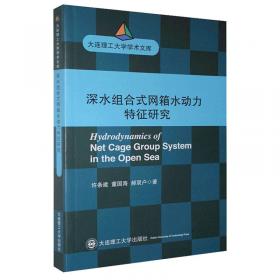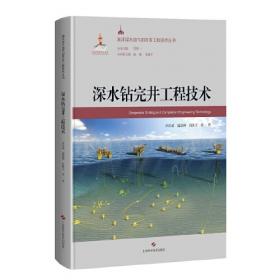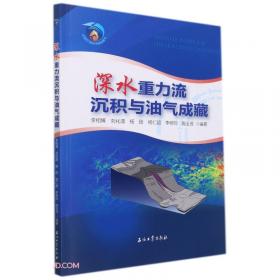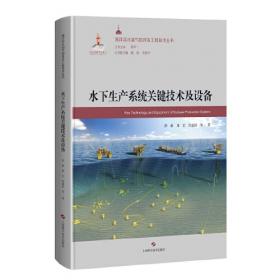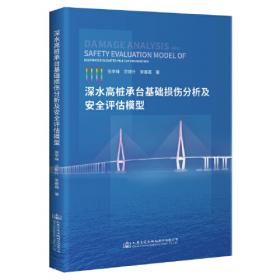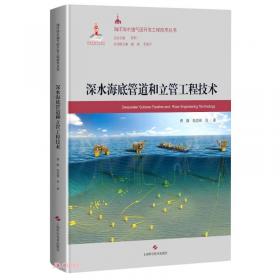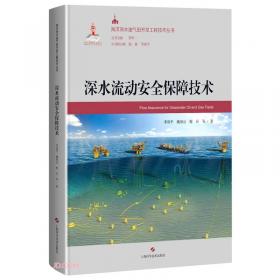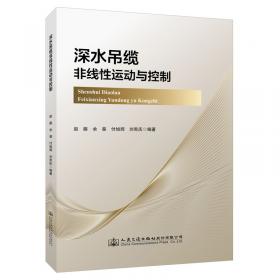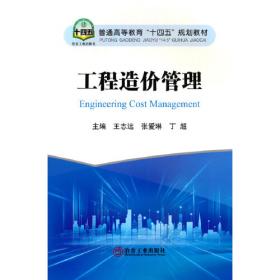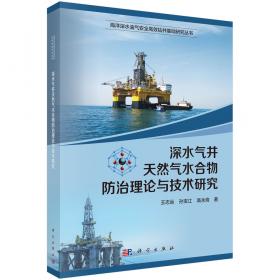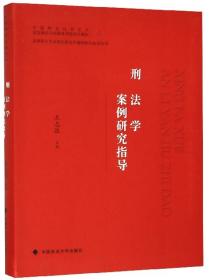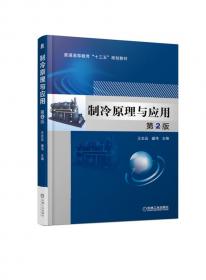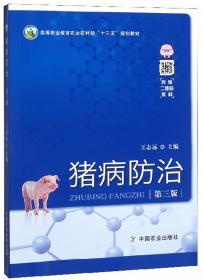深水气井天然气水合物防治理论与技术(英文版)
出版时间:
2020-06
版次:
31
ISBN:
9787030644190
定价:
318.00
装帧:
其他
开本:
128开
纸张:
胶版纸
页数:
232页
-
This book mainly describes the theories and technologies for natural gas hydrate management in the deepwater gas well. There are 7 chapters in this book. Chapter 1 is an overview on hydrate risks in deepwater oil and gas development, which mainly introduces the hydrate formation and its hazards in deepwater oil and gas development; Chapter 2 is the formation and decomposition of natural gas hydrate, and the hydrate phase equilibrium model, the calculation method of hydrate formation and decomposition rates are given; Chapter 3 is the prediction for natural gas hydrate formation area in deepwater gas well, and puts forward related quantitative prediction method; Chapter 4 is the influence of hydrate phase transition on multi-phase flow in deepwater drilling well, which analyzes the change of multi-phase flow in the deepwater wellbore; Chapter 5 is the mechanism and prediction method for hydrate deposition and blockage in deepwater gas well, and establishes the related hydrate blockage model; Chapter 6 is the hydrate management technology in deepwater gas well, in which one new hydrate blockage management method based on HBFW is proposed. Chapter 7 is hydrate management software in deepwater gas well and case analysis, which analyzes the hydrate management schemes in deepwater gas well by case. Contents
1 Overview on Hydrate Risks in Deepwater Oil and Gas Development 1
1.1 Engineering Background of Hydrate Risks 1
1.2 Hydrate Risks During Deepwater Drilling and Well Control 2
1.3 Hydrate Risks During Deepwater Gas Well Test 4
1.4 Hydrate Risks During Deepwater Oil and Gas Production 4
1.5 Management Measures for Hydrate Risks 5
References 6
2 Formation and Decomposition of Natural Gas Hydrate 9
2.1 Structure and Formation of NGH 9
2.2 Formation of NGH 13
2.2.1 Hydrate Phase Equilibrium Condition 13
2.2.2 Hydrate Formation Dynamics 19
2.2.3 Hydrate Formation in Gas Phase with Free Water and Its Rate 23
2.2.4 Hydrate Formation in Gas Phase Without Free Water and Its Rate 27
2.3 Decomposition of NGH 35
2.3.1 Hydrate Decomposition Above Freezing Point 36
2.3.2 Hydrate Decomposition Below Freezing Point 38
2.4 Formation and Decomposition of Hydrate Converted from Moving Bubbles 40
2.4.1 Mass Transfer Model of Moving Bubbles 40
2.4.2 Interphase Mass Transfer Rate 45
2.4.3 Formation and Decomposition of Hydrate Converted from Moving Bubbles 46
References 47
3 Prediction for NGH Formation Area in Deepwater Gas Well 51
3.1 Coupling Between Hydrate Behavior and Multi-phase
Flow Characteristics 51
3.2 Prediction on Well/Pipeline Temperature and Pressure Fields in Annular-Mist Flow 53
3.2.1 Multiphase Flow Model 53
3.2.2 Model Solution 60
3.2.3 Model Validation 61
3.3 Prediction on Well/Pipeline Temperature and Pressure Field in Water-Saturated Gas Systems 65
3.3.1 Temperature Field Model 65
3.3.2 Pressure Field Model 67
3.4 Influencing Factors of NGH Phase Equilibrium in Well/Pipeline 67
3.4.1 Natural Gas Components 68
3.4.2 Natural Gas Density 68
3.4.3 Thermodynamic Inhibitor 69
3.4.4 Sand Content 70
3.5 Prediction and Influence Factors of Hydrate Formation Area in Deepwater Gas Well 73
3.5.1 Prediction Methods of Hydrate Formation Area Under Different Working Conditions 73
3.5.2 Influencing Factors of Hydrate Formation Area During Drilling 74
3.5.3 Influencing Factors of Hydrate Formation Area During Well Control 76
3.5.4 Influencing Factors of Hydrate Formation Area During Well Test 78
References 82
4 Influence of Hydrate Phase Transition on Multiphase Flow in Deepwater Gas Well 85
4.1 Influence of Hydrate Phase Transition on the Rheology of Drilling Fluid 85
4.1.1 Experimental Device 86
4.1.2 Drilling Fluid Rheology Model Considering Hydrate Formation 87
4.1.3 Hydrate Formation Integration Constant of CHF 90
4.2 Influence of Hydrate Phase Transition on Multiphase Flow During Deepwater Drilling 96
4.2.1 Well Annulus Multiphase Flow Model During Deepwater Drilling 96
4.2.2 Influence of Hydrate Phase Transition on Bubble Migration 101
4.2.3 Influence of Hydrate Phase Transition on Well Multiphase Flow Without Inhibitors 103
4.2.4 Influence of Hydrate Phase Transition on Well Multiphase Flow with Inhibitors 107
References 108
5 Mechanism and Prediction for Hydrate Deposition and Blockage in Deepwater Gas Well 111
5.1 Hydrate Particles Interactions 111
5.1.1 Interaction Force Between Hydrate Particles 114
5.1.2 Interaction Force of Hydrate Particle-Droplet-Hydrate Particle 118
5.1.3 Interaction Force of Hydrate Particle-Droplet-Hydrate Particle Considering Liquid Bridge Solidification 125
5.2 Hydrate Deposition and Blockage Model in Gas-Liquid-Solid Three-Phase Flow 130
5.2.1 Initial Deposition Model of Hydrate Particle in Gas Core 131
5.2.2 Influence of Liquid Film Atomization on Hydrate Particles Deposition 132
5.2.3 Effective Deposition Coefficient of Hydrate Particle in Gas Core 133
5.2.4 Hydrate Layer Growth and Hydrate Blockage 135
5.2.5 Model Solution and Validation 136
5.3 Hydrate Deposition and Blockage Model in Gas-Solid Two-Phase Flow 143
5.3.1 Theory on Radial Migration of Solid Particles in Gas-Solid Two-Phase Flow 144
5.3.2 Wells and Friedlander Model 144
5.3.3 Hydrate Particles Deposition in Gas-Solid Two-Phase Flow 147
5.3.4 Model Solution and Validation 149
5.4 Hydrate Deposition and Blockage Model in Water-Saturated Gas Single-Phase Flow 152
5.4.1 Hydrate Deposition and Blockage Model 153
5.4.2 Model Solution and Validation 154
5.5 Prediction for Hydrate Blockage During Deepwater Gas Well Control 156
5.5.1 Basic Parameters in Case 156
5.5.2 Prediction for Hydrate Formation Area 158
5.5.3 Laws of Hydrate Deposition and Blockage 158
5.5.4 Influence of Hydrate Deposition on Wellhead Back Pressure 166
5.6 Prediction for Hydrate Blockage During Deepwater Gas Well Test 167
5.6.1 Hydrate Blockage Free Window (HBFW) 167
5.6.2 Model Solution Steps 168
5.6.3 Quantitative Prediction for Hydrate Blockage 169
5.6.4 Case Analysis for Predicting the Hydrate Blockage 171
References 177
6 Technologies for Hydrate Management in Deepwater Gas Well 181
6.1 C
-
内容简介:
This book mainly describes the theories and technologies for natural gas hydrate management in the deepwater gas well. There are 7 chapters in this book. Chapter 1 is an overview on hydrate risks in deepwater oil and gas development, which mainly introduces the hydrate formation and its hazards in deepwater oil and gas development; Chapter 2 is the formation and decomposition of natural gas hydrate, and the hydrate phase equilibrium model, the calculation method of hydrate formation and decomposition rates are given; Chapter 3 is the prediction for natural gas hydrate formation area in deepwater gas well, and puts forward related quantitative prediction method; Chapter 4 is the influence of hydrate phase transition on multi-phase flow in deepwater drilling well, which analyzes the change of multi-phase flow in the deepwater wellbore; Chapter 5 is the mechanism and prediction method for hydrate deposition and blockage in deepwater gas well, and establishes the related hydrate blockage model; Chapter 6 is the hydrate management technology in deepwater gas well, in which one new hydrate blockage management method based on HBFW is proposed. Chapter 7 is hydrate management software in deepwater gas well and case analysis, which analyzes the hydrate management schemes in deepwater gas well by case.
-
目录:
Contents
1 Overview on Hydrate Risks in Deepwater Oil and Gas Development 1
1.1 Engineering Background of Hydrate Risks 1
1.2 Hydrate Risks During Deepwater Drilling and Well Control 2
1.3 Hydrate Risks During Deepwater Gas Well Test 4
1.4 Hydrate Risks During Deepwater Oil and Gas Production 4
1.5 Management Measures for Hydrate Risks 5
References 6
2 Formation and Decomposition of Natural Gas Hydrate 9
2.1 Structure and Formation of NGH 9
2.2 Formation of NGH 13
2.2.1 Hydrate Phase Equilibrium Condition 13
2.2.2 Hydrate Formation Dynamics 19
2.2.3 Hydrate Formation in Gas Phase with Free Water and Its Rate 23
2.2.4 Hydrate Formation in Gas Phase Without Free Water and Its Rate 27
2.3 Decomposition of NGH 35
2.3.1 Hydrate Decomposition Above Freezing Point 36
2.3.2 Hydrate Decomposition Below Freezing Point 38
2.4 Formation and Decomposition of Hydrate Converted from Moving Bubbles 40
2.4.1 Mass Transfer Model of Moving Bubbles 40
2.4.2 Interphase Mass Transfer Rate 45
2.4.3 Formation and Decomposition of Hydrate Converted from Moving Bubbles 46
References 47
3 Prediction for NGH Formation Area in Deepwater Gas Well 51
3.1 Coupling Between Hydrate Behavior and Multi-phase
Flow Characteristics 51
3.2 Prediction on Well/Pipeline Temperature and Pressure Fields in Annular-Mist Flow 53
3.2.1 Multiphase Flow Model 53
3.2.2 Model Solution 60
3.2.3 Model Validation 61
3.3 Prediction on Well/Pipeline Temperature and Pressure Field in Water-Saturated Gas Systems 65
3.3.1 Temperature Field Model 65
3.3.2 Pressure Field Model 67
3.4 Influencing Factors of NGH Phase Equilibrium in Well/Pipeline 67
3.4.1 Natural Gas Components 68
3.4.2 Natural Gas Density 68
3.4.3 Thermodynamic Inhibitor 69
3.4.4 Sand Content 70
3.5 Prediction and Influence Factors of Hydrate Formation Area in Deepwater Gas Well 73
3.5.1 Prediction Methods of Hydrate Formation Area Under Different Working Conditions 73
3.5.2 Influencing Factors of Hydrate Formation Area During Drilling 74
3.5.3 Influencing Factors of Hydrate Formation Area During Well Control 76
3.5.4 Influencing Factors of Hydrate Formation Area During Well Test 78
References 82
4 Influence of Hydrate Phase Transition on Multiphase Flow in Deepwater Gas Well 85
4.1 Influence of Hydrate Phase Transition on the Rheology of Drilling Fluid 85
4.1.1 Experimental Device 86
4.1.2 Drilling Fluid Rheology Model Considering Hydrate Formation 87
4.1.3 Hydrate Formation Integration Constant of CHF 90
4.2 Influence of Hydrate Phase Transition on Multiphase Flow During Deepwater Drilling 96
4.2.1 Well Annulus Multiphase Flow Model During Deepwater Drilling 96
4.2.2 Influence of Hydrate Phase Transition on Bubble Migration 101
4.2.3 Influence of Hydrate Phase Transition on Well Multiphase Flow Without Inhibitors 103
4.2.4 Influence of Hydrate Phase Transition on Well Multiphase Flow with Inhibitors 107
References 108
5 Mechanism and Prediction for Hydrate Deposition and Blockage in Deepwater Gas Well 111
5.1 Hydrate Particles Interactions 111
5.1.1 Interaction Force Between Hydrate Particles 114
5.1.2 Interaction Force of Hydrate Particle-Droplet-Hydrate Particle 118
5.1.3 Interaction Force of Hydrate Particle-Droplet-Hydrate Particle Considering Liquid Bridge Solidification 125
5.2 Hydrate Deposition and Blockage Model in Gas-Liquid-Solid Three-Phase Flow 130
5.2.1 Initial Deposition Model of Hydrate Particle in Gas Core 131
5.2.2 Influence of Liquid Film Atomization on Hydrate Particles Deposition 132
5.2.3 Effective Deposition Coefficient of Hydrate Particle in Gas Core 133
5.2.4 Hydrate Layer Growth and Hydrate Blockage 135
5.2.5 Model Solution and Validation 136
5.3 Hydrate Deposition and Blockage Model in Gas-Solid Two-Phase Flow 143
5.3.1 Theory on Radial Migration of Solid Particles in Gas-Solid Two-Phase Flow 144
5.3.2 Wells and Friedlander Model 144
5.3.3 Hydrate Particles Deposition in Gas-Solid Two-Phase Flow 147
5.3.4 Model Solution and Validation 149
5.4 Hydrate Deposition and Blockage Model in Water-Saturated Gas Single-Phase Flow 152
5.4.1 Hydrate Deposition and Blockage Model 153
5.4.2 Model Solution and Validation 154
5.5 Prediction for Hydrate Blockage During Deepwater Gas Well Control 156
5.5.1 Basic Parameters in Case 156
5.5.2 Prediction for Hydrate Formation Area 158
5.5.3 Laws of Hydrate Deposition and Blockage 158
5.5.4 Influence of Hydrate Deposition on Wellhead Back Pressure 166
5.6 Prediction for Hydrate Blockage During Deepwater Gas Well Test 167
5.6.1 Hydrate Blockage Free Window (HBFW) 167
5.6.2 Model Solution Steps 168
5.6.3 Quantitative Prediction for Hydrate Blockage 169
5.6.4 Case Analysis for Predicting the Hydrate Blockage 171
References 177
6 Technologies for Hydrate Management in Deepwater Gas Well 181
6.1 C
查看详情
-
全新
湖南省长沙市
平均发货42小时
成功完成率84.01%
-
全新
北京市丰台区
平均发货23小时
成功完成率88.58%
-
九品
北京市昌平区
平均发货23小时
成功完成率86.24%
-
全新
山东省泰安市
平均发货8小时
成功完成率98.1%
-
全新
江苏省宿迁市
平均发货25小时
成功完成率87.95%
-
全新
湖北省武汉市
平均发货15小时
成功完成率93.77%
-
全新
北京市房山区
平均发货12小时
成功完成率91.08%
-
九五品
北京市东城区
平均发货33小时
成功完成率83.54%
-
全新
江苏省无锡市
平均发货8小时
成功完成率95.79%
-
全新
四川省成都市
平均发货9小时
成功完成率96.96%
-
全新
四川省成都市
平均发货25小时
成功完成率86.79%
-
全新
江苏省南京市
平均发货7小时
成功完成率98.07%
-
全新
北京市丰台区
平均发货8小时
成功完成率90.48%
-
全新
北京市朝阳区
平均发货20小时
成功完成率84.77%
-
全新
北京市通州区
平均发货16小时
成功完成率96.18%
-
全新
北京市朝阳区
平均发货14小时
成功完成率84.88%
-
全新
北京市海淀区
平均发货11小时
成功完成率93.22%
-
全新
上海市黄浦区
平均发货11小时
成功完成率94.52%
-
全新
江苏省无锡市
平均发货18小时
成功完成率94.49%
-
全新
江苏省南京市
平均发货16小时
成功完成率82.88%
-
全新
江苏省南京市
平均发货8小时
成功完成率96.66%
-
全新
北京市房山区
平均发货18小时
成功完成率98.21%
-
全新
北京市通州区
平均发货9小时
成功完成率89.05%
-
全新
山东省泰安市
平均发货18小时
成功完成率92.6%
-
全新
河北省保定市
平均发货15小时
成功完成率91.29%
-
全新
北京市朝阳区
平均发货9小时
成功完成率96.8%
-
全新
江苏省无锡市
平均发货10小时
成功完成率93.19%
-
全新
天津市河东区
平均发货28小时
成功完成率90.17%
-
全新
广东省广州市
平均发货20小时
成功完成率86.34%
-
全新
上海市闵行区
平均发货33小时
成功完成率79.12%
-
全新
北京市西城区
平均发货29小时
成功完成率90.47%
-
全新
北京市顺义区
平均发货15小时
成功完成率93.81%
-
全新
北京市顺义区
平均发货23小时
成功完成率93.75%
-
全新
北京市朝阳区
平均发货13小时
成功完成率93.29%
-
全新
北京市房山区
平均发货15小时
成功完成率78.57%
-
全新
广东省广州市
平均发货18小时
成功完成率87.23%
-
全新
北京市通州区
平均发货51小时
成功完成率80.33%
-
全新
北京市通州区
平均发货57小时
成功完成率71.97%
-
全新
广东省广州市
平均发货7小时
成功完成率89.52%
-
全新
北京市房山区
平均发货21小时
成功完成率65.62%
-
全新
北京市丰台区
平均发货22小时
成功完成率100%
-
全新
北京市房山区
平均发货13小时
成功完成率90.49%
-
全新
北京市通州区
平均发货70小时
成功完成率80.41%
-
全新
北京市丰台区
平均发货11小时
成功完成率82.35%
-
全新
北京市通州区
平均发货43小时
成功完成率52.63%
-
全新
江苏省无锡市
平均发货8小时
成功完成率87.39%
-
全新
四川省成都市
平均发货10小时
成功完成率94.03%
-
全新
江苏省无锡市
平均发货7小时
成功完成率89.16%
-
全新
广东省广州市
平均发货9小时
成功完成率86.98%
-
全新
北京市通州区
平均发货49小时
成功完成率77.78%

 占位居中
占位居中

